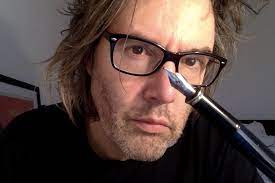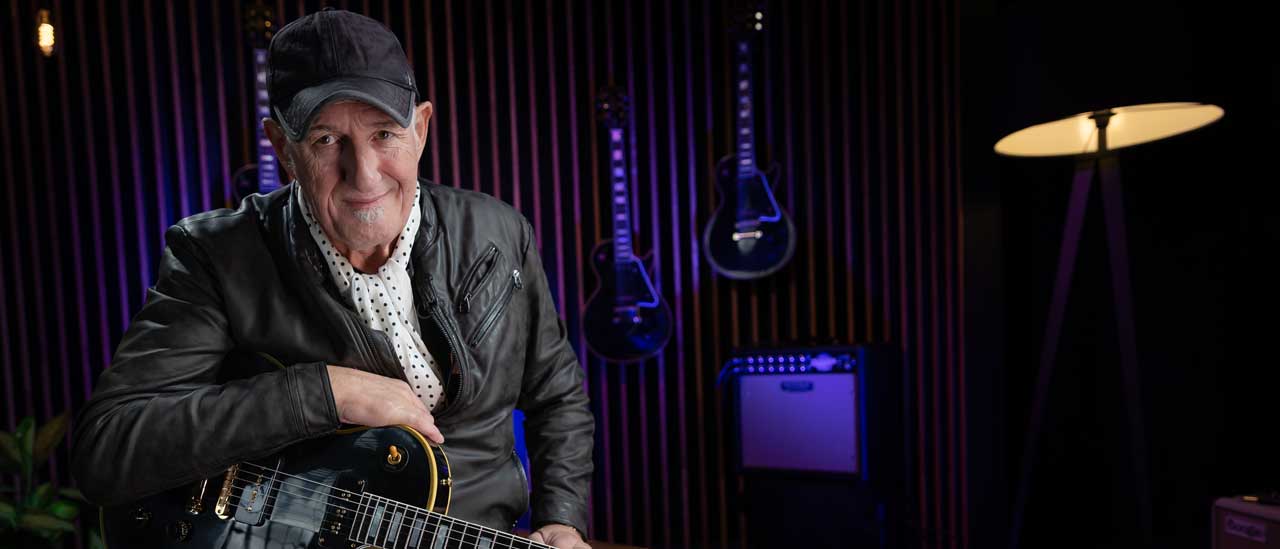"I've mastered what I was aiming for thirty years ago": Neil Peart - The Clockwork Angels interview
In 2012 Rush's drummer Neil Peart told us about modern alchemy, thinking big, how Nirvana influenced Rush, and why he'd never watch Beyond The Lighted Stage
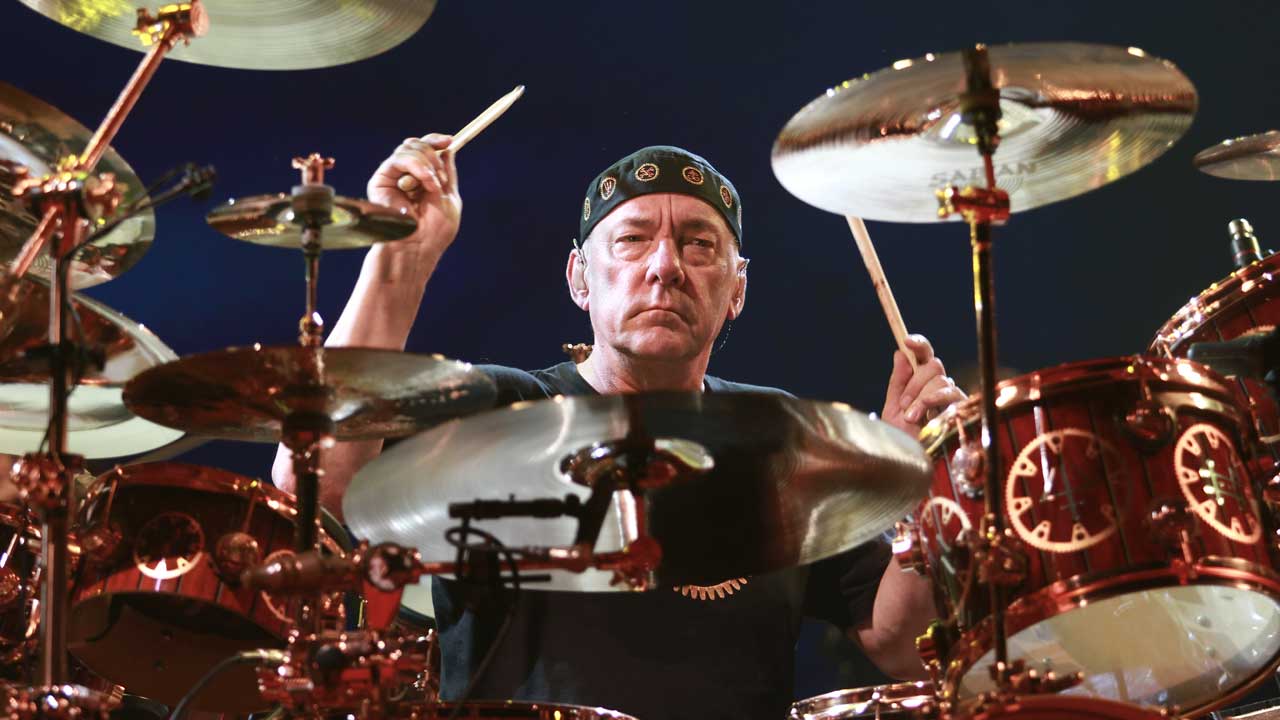
In 2012 Classic Rock published a Rush fanpack, which presented the Canadian trio's then-new album Clockwork Angels alongside a 132-page magazine that formed the ultimate guide to album. The magazine included extensive and exclusive interviews with Geddy Lee, Alex Lifeson and the late Neil Peart. Our chat with Peart is reproduced below in full.
The hilly residential enclave of California’s Topanga Canyon attracts a certain crowd best described as ‘well-heeled bohemian’. It’s been pulling in the great and the good for years: Neil Young used to live here, as did Marvin Gaye; Stephen Stills too. Taylor Hawkins lives somewhere over the hill. Nancy Wilson is a few miles down the road, and some of the guys from Tool have homes here too.
That said, The Inn Of The Seventh Ray is still something of an eye-opener. The restaurant’s generous patio looks out over a small babbling brook, while the speakers overhead play an extraordinary mixture of pan pipes and soothing new age tunes; a particularly ‘unique’ interpretation of Greensleeves makes us look up sharply from our raw soup. Soup, the menu informs us, that’s been ‘created through the vibrations of each day’.
Neil Peart’s impish grin tells you two things; that he loves this place, and that he’s very much enjoying the bemused look on Classic Rock’s face. He’s just driven up here from his home after a morning workout at the gym and pool in preparation for Rush’s next North American tour, which is still some months away. Like the Boy Scouts, Peart’s always prepared. This is the man, after all, who plays drums for an hour to warm up before he goes on stage. As Geddy Lee says: “He drums to drum.”
Peart pulls back a chair and peruses the menu. There’s that grin again. “I thought we could do a yoga session instead of the interview.”

This place is incredible…
Isn’t this good? I’m so glad I thought of it, because you have to take a minute sometimes. You and I have to do this thing, but I was thinking, what’s the best possible way we can do it? It’s how I live when we’re travelling on the road: if I have a day off, what’s the best possible thing that I can do? Can I go to the Grand Canyon? Can I go to a national park? Can I go to the desert? And today was no different, given that I want to talk to you and you want to talk to me for various reasons, but if we have to do that, then why not make it something cool? I love it here.
Sign up below to get the latest from Classic Rock, plus exclusive special offers, direct to your inbox!
Let’s talk about the new Clockwork Angels album. It’s so full of life, and you improvised a lot of your parts this time, which is a first.
There was so much improvisation, and that makes it all the edgier. As I wrote in my little essay about it for the band biography, I think the listener can feel that. It’s like listening to The Who’s Live At Leeds; you can feel the band on the edge between total control and total chaos. You only do that kind of performance once; the spontaneity makes it so fresh and thrilling.
A lot of it came from the new freedom you found improvising on this last tour, didn’t it?
Yep. All of us in our various solo spots were pushing it and going out there, and it was phenomenal for each of us to share. All unknowing, I started that a few years ago when I studied with Peter Erskine (Weather Report, Steely Dan, Kate Bush); part of what he taught me was with the metronome and hi-hat only, and I came out of that with such a sense of time. I can listen to two things now, and go somewhere really far outside and still draw back and drop in, so there’s so much more stuff that I can get away with.
I do that on stage now. On that last tour, I found for the first time that if someone makes a mistake and gets out of time I can hear what’s happening and what ought to be happening at the same time. I can step back and see what we need to do until we’re tight again. I can figure it out and smooth over those train wrecks. In the forty-five years I’ve been playing, this is a whole new plateau.
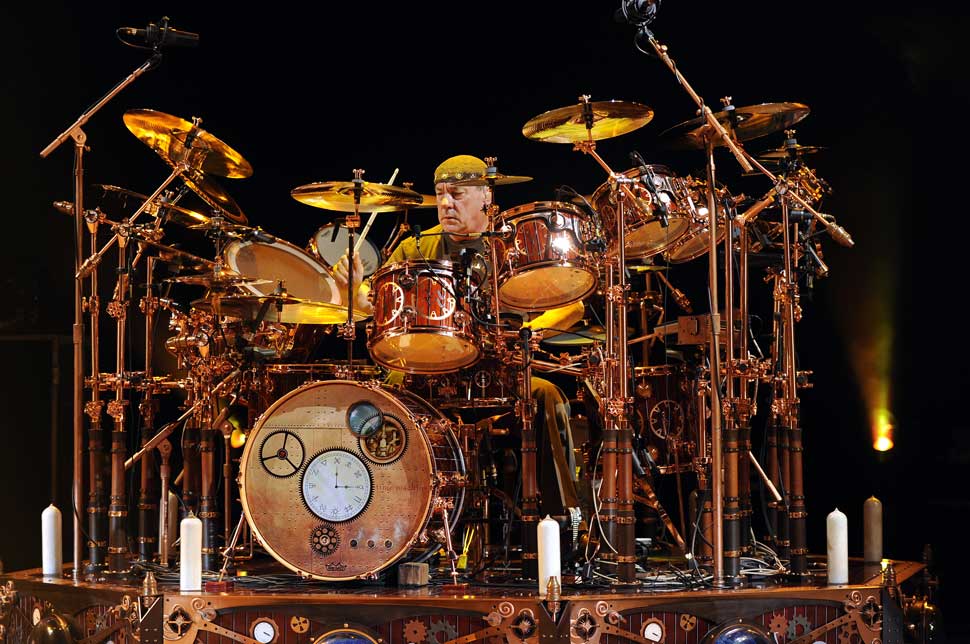
Both Ged and Alex have commented on what Nick Raskulinecz as a producer has brought to the band, but it sounds as if the work he’s done with you has been especially important.
He goofs around, but the enthusiasm and the energy is fantastic. The first time we worked he’d ask me to play something, and would mimic it and sing the parts, and it would be so over the top, just extraordinary, I’d be ashamed to throw a fill like that in myself. But I’d be like, okay and then I’d pull it off and he’d be, ‘That’s great!’ It’s like the Caravan drum fill that I laid out, we went back into the booth to listen and Ged looked over his glasses at me and said, ‘Oh, he wants to make you famous.’
This time, it was more immediate. He was in the room with me, not listening to playbacks – he was right there, so that every time we stopped, we’d be conversing over the parts. He was playing along with me, I didn’t have to learn the arrangements. He’s a generation younger than us too, and that’s kind of an important touchstone. We did Snakes & Arrows with him and wanted him back, and he wanted to be back. He’s the perfect catalyst, that’s the word; he’s more than a collaborator…
He brings out the best in you?
I don’t know how people work without that sort of honest input that Nick gives us. I remember Stewart Copeland asked me one time about how we work and why we have a co-producer; he couldn’t understand the dynamic. It was not the way The Police got things done, but talk about a band that was riven from the beginning by divisions – we’ve stayed so close, oh, they were so drawn apart and then they had to select a co-producer who was almost a moderator to placate things in the studio. Stewart’s memoir, have you read it? It’s called Strange Things Happen – it’s really good, I highly recommend it. The stories he can tell…
I was telling him a story about the three of us, about a song we were working on, and he said, ‘You guys talk to each other like that?’ Reasonably, you know? And he came to see us at the Vegas MGM Grand and came in during the intermission and I said, ‘You must have played here,’ and he said, ‘Yeah, a couple of times.’ And he said, ‘There’s a piece of someone’s ear over there; I think I kicked Sting over there.’ I understand what some bands can be like. I’m not judging. But how awful. It was funny to me, that just my describing a conversation that Alex, Geddy and I had about our future plans was of total disbelief to him. He couldn’t believe that a band could be like that.
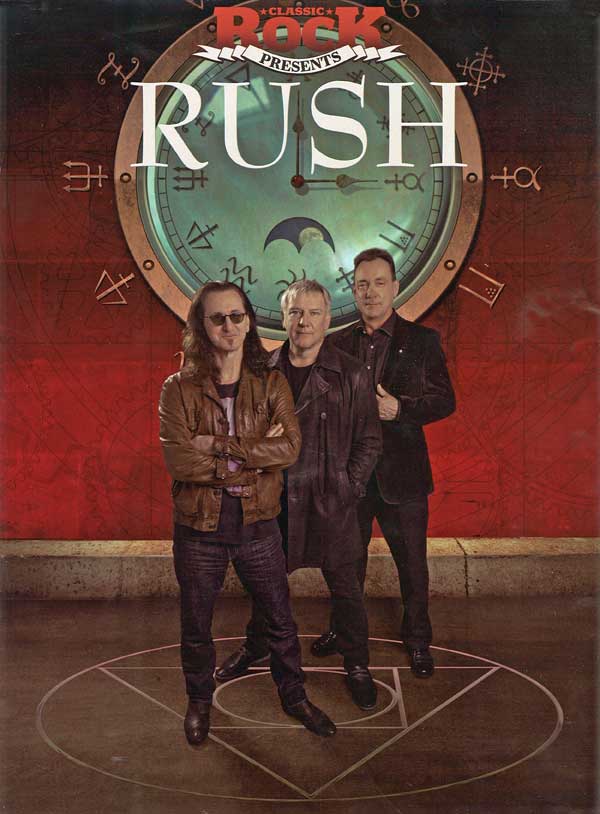
It’s a very modern sounding record, but you’re not afraid to give a nod to the past.
What was it that Oscar Wilde said? ‘Self-plagiarism is style.’ We certainly do a few tongue-in-cheek nods to Bastille Day on Headlong Flight, that’s deliberate.
In the essay you’ve written for the album you say that these songs, “tell a story set in an alternate timeline, with alchemy, clockwork, and steampunkery.” And it also addresses the Meaning of Life. You don’t like making things easy for yourself, do you?
I know, I can’t help it. The starting point was the steampunk idea. I was aware of it as a reader. My good friend Kevin Anderson – who has done the novelisation of this album – he’s so prolific and so skillful, and he was one of the pioneers of the style, for sure. I love how it’s a direct counterpoint to cyberpunk, it’s like a different vision of the future.
So I was enthralled by that theme, and my character’s journey through this world. I also had in mind Voltaire’s Candide too, that was a germ of it. Plus, there was so much stuff I’d been reading about the circus stuff, the carnies, from Robertson Davies’ novels, and I’d read a lot of history from the south western part of the US, geographically – the most interesting and the most beautiful, too – and that figured into the story of the explorer Coronado who kept going out into the desert to find the fabled cities of gold, but could never quite get there.
And The Wreckers was actually from Daphne Du Maurier, even though they were real. Some would just wait for a ship to wreck and plunder it, but others would set up lights to deliberately draw the ships in so they would wreck. That’s been in my mind for thirty years, since I read that story – I guess it’s an episode in Jamaica Inn. So all of that coalesced into the character and the history of the story, the whole concept.
Headlong Flight was partly inspired by the death last year of your friend and drum teacher, Freddie Gruber.
Freddie gave me the line in that song, ‘I wish I could do it all again’. Because there he is: 84, he grew up in New York in the 40s, worked out through Chicago and Vegas in the 50s, LA in the 60s, and since then his path has crossed with everybody. And his response to it all was: ‘I’ve had quite a ride, I wish I could do it all again.’ I don’t feel that way. Maybe I will when I’m older. Nevertheless, I respected it so much, and what a great thing for my character to reflect upon.
And anyone who’s subject to depression or has suffered grief knows that even sunny days can look dark, right? So that little couplet occurred to me, ‘Some days were dark, some nights were bright, I wish I could live it all again’. It worked perfectly for my character, but it’s obviously a tribute to Freddie too. I love that I could make it personal as well as universal.
You said that The Anarchist was partly inspired by Joseph Conrad’s The Secret Agent.
In part. That’s where that character comes from, there and Michael Ondaatje’s In The Skin Of A Lion. He has a central character who’s a committed terrorist/anarchist. Anarchy is an innocent Utopian thing for him, an ideal.
But Wish Them Well is more personal, yes?
I have a very large circle of friends, really close friends, and once a year or so I lose one of those. And it’s either a succession of unfriendly acts against me, or some betrayal, which is unforgivable, you know? They’re sad in a way, but you have to remove them from your life. I don’t hate them, I won’t bear a grudge, but you can’t be a part of me anymore. So, that sentiment, Geddy really responded to it as well. It’s a really humane way to be: ‘I don’t want to be around people like you, but I wish you well’.
How hard was it to get the whole idea of making a concept album started?
It’s funny… It started with Geddy’s suggestion that we make a compilation of all our instrumentals and write a new one to go with it, perhaps something more extended, and that was the trigger for me. Then I got thinking… I was all hyped on the steampunk aesthetic at the time, you know? What if we went long, and developed it? To paraphrase Caravan, I couldn’t stop thinking big, really.
Was there a point where it all came together, or was it more a case that it evolved?
‘Process’ is probably the right word. I had three titles for chapters: Caravan, Carnival and Caravel. I was going to have them convey the journey, and they all evolved into a much more developed story.
It’s a bold undertaking.
We know, it is bold. But we couldn’t not do it, once it started to come together. It evolved so beautifully; a few songs came together and then we went out on tour. We couldn’t help ourselves, we even used the stage set we’d built for Clockwork Angels.
You’ve created a whole other world for the album… How much more will that be developed in the novelisation of the record that Kevin Anderson’s working on with you?
The one thing I’ve learnt from Kevin is that it can be as wild as possible in terms of imagining, but people have to do what people would do. It has to be logically consistent, and Kevin and I have been much more involved in the world building for the novel. Clockwork Angels the novel is very much the notes version, the lyrics are the footnotes.
You and Kevin go back years…
He sent me his novel, Resurrection, Inc., around the late 80s, and it sat around for years, with a big lurid skull sci-fi cover. But when I finally did read it, I was blown away, because it was a novel of ideas. I went to visit him up in Northern California and we got together pretty much every time I came through. From the beginning we talked about making a project together; he had a novel planned and he wanted us to do an album in tandem way back then, but that never worked out timing-wise and mood-wise and whatever. So, as soon as I saw this coming together, I thought, here’s the perfect opportunity.
There’s a narrative to the album – a young man’s quest across a world of steampunk and alchemy. I’m paraphrasing, obviously, but it’s almost deliberately vague in parts. Will the book fill in the gaps?
We did want to leave a bit of mystery to all of it. The book will come out in time for the tour, so people have a few months to dream up that world for themselves. I’m consulting with Kevin all the way along and he’s constructing the novel to follow the pattern of the album. But we had to come up with so much else in terms of the world and the characters.
Whittling it all down sounds like a tough undertaking.
It was very difficult, because I wrote reams of lyrics as I had a big story to tell, and then Geddy chiselled it down. He’ll have a song that he and Al have constructed and they make it fit, so adjectives go flying out of the window, imagery goes, so it becomes very concise in terms of action and portrayal, which I don’t mind. But I worked so hard, syllable by syllable, to get maximum value…
It feels very distilled, very direct.
Exactly. Distil and compress. There’s a lot under the skin, that’s to the needs of the music, and we were determined not to be archaic. Some of the shipwreck adventures, the seafaring language that I’d come up with, was deemed not suitable for the streamlined model we were pursuing.
So it all adds to the immediacy of the album?
It’s the spontaneity and the craft. I guess the songs started just as jams, and Ged was really responsible for that part of things, sifting and then stitching things together, and then the two of us bringing up the lyrics and hammering – that is the word I’m looking for – and then distilling them down into that fine essence. I wrote little prose interludes between songs to try and clarify the action, some interstitial tissue to join it all together a little bit, which ultimately the book will do, so that’s fine. So I made them very minimal, just to give them some colour. I like to give people a hint, if they care. When I was a kid, I never listened to lyrics…
That’s like hearing that Quentin Tarantino doesn’t watch violent movies!
Ha! But it’s perfectly legitimate not to listen to the lyrics – you just sense they’re good, care has been taken here, you know. That’s what I always think about drumming: people don’t have to know about the technique of drumming or song-writing or arranging, but they can sense that care has been taken, that’s the content we receive in certain quarters. ‘Can’t you see? We’re trying hard here…’
You’ve introduced alchemy into the story: the ‘u’ in Rush on the cover is the alchemic sign for amalgamation, right?
That’s right. I was just fascinated by the alchemic elements, because they’re beautiful. I came across them in the Diane Ackerman’s book, An Alchemy Of Mind, a beautiful book in every other way, and I happened to notice that design, and I got curious. What are they? Where are they from? It goes back to Egyptian times and was considered science. It’s still practiced in a cultish sort of way; in fact, there was a symbol for silicone that said ‘for modern alchemy only’. Now think about those words: boom! ‘Modern alchemy’ – what?!
And those alchemic elements are repeated on the album cover too.
It’s enigmatic. It’s one of those things, even in the artwork, we’re never going to show the angels. They’re going to remain imaginary. Even in the novel we never describe them too much, just to say that they are larger than life and clockwork and hydraulic. There are sounds in the mix, there are all these backward echoes: to me, that evokes the great wings, these figures of such majesty. And then I was thinking, too, of the circle of where you are in your life and what you’re learning about and what you’re preoccupied with, where you are on your journey.
Also, I love the alchemic idea of the quintessence, that it’s the fifth essence, some kind of dark energy; it’s so intriguing. And the philosopher’s stone [believed by some to be able to turn base metal into gold and silver], the square inside a triangle inside a circle, it means squaring the circle. It’s fascinating stuff. You don’t have to believe any of it. Fairy tales and religion are fascinating if you don’t believe them.
Talking of the journey, you turn 60 this year: how does that feel?
I feel proud as hell. I’m at the height of my powers in one sense, but also I can’t help feeling the empathy for someone like Keith Moon; he never got to be 59. Dennis Wilson neither. John Bonham… These are cautionary tales in a sense, but they break my heart: they had children, they had loved ones, they never got there, they never got this.
This?
This. Our career. By good luck and design, we take the trouble; I’m already in training for the tour in September, I’m physically training now, and in June I’ll start the first rehearsals, and then in July we’ll rehearse as a band for close to two months, because there’s so much new material to develop. So for a tour starting in September, I’m already working on it now.
Do you get glimpses of your younger self when you play the older material? You said as much the first time you went out did 2112 in its entirety.
When I’m relearning the material to tour and I’m playing along with those parts, I’m always in touch with that. We’re about to be given the Governor General’s Award and they’ve made a film of us for it, juxtaposing our band with a band of 17-year-old aspiring progressive musicians. We’ve just filmed our part of it, and I was able to say that I very much keep in touch with my inner 17-year-old and I’ll check in with him about a decision sometimes: ‘do you think that’s cool?’, or ‘do you think that’s alright?’
I had a very strong sense of right and wrong at that age, and a lot of it was good: a sense of the purity of music, that I’ll do a lot of things for money but not music. I accepted being semi-pro all those years because I could make a living other ways, but other musicians I knew back then would make that their guiding principle, so they’d play polkas and country. And I just said no…
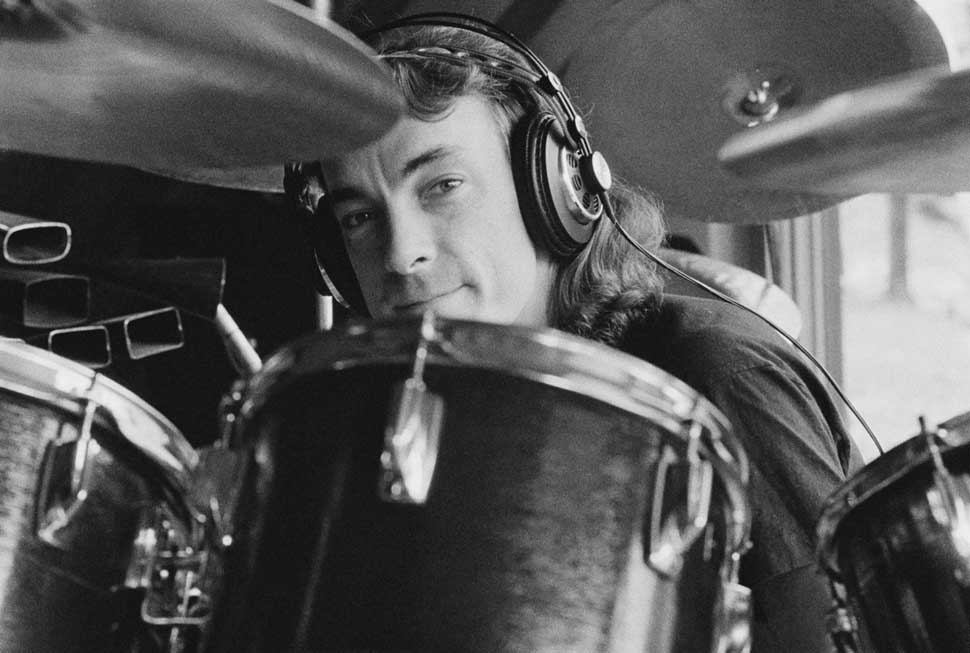
There are a lot of people who would pay good money to watch you play a polka.
I could do it too. I’m always glad that when I listen to the early songs and the lyrics and all of that, yeah, maybe the craft is lacking, but the spirit was true. I might have had more energy than control then, and I was aspiring to what I have now – the kind of technique and control – but that’s what I was trying to do, even back then. I’ve mastered what I was aiming for thirty years ago. I hear it in there, all this ambition, all this energy, but without the deeper understanding of time that we as a band have now.
There are some dirty grooves on this record, stuff I wanted to do thirty years ago but I would approximate it; now I can deliver it, pull way back on the time and dig in deep, Boosh [producer Nick Raskulinecz] in front of me conducting, and it’s delivered with the most sublime technique. That’s what I love.
You can hear all those years of work in this album; the title track is as good as anything you’ve ever done.
It really is. I hope it’s in the live show forever. That song, too, is the oldest piece of music. Alex gave us a little demo way back before we started writing, and right away I pointed at that one and said, ‘We’ve never done anything with that kind of feel.’ As a drummer I wanted that, it was so good and I wanted so much to play it. It’s so unusual for us, but it still has all the intricacies and techniques and the challenge and, obviously, the performance.
And so much melody too, it’s a really pleasant surprise.
Listen to The Wreckers. When Ged and Al came out with that, they were really pleased that they’d written a Barenaked Ladies song! That was how they told it. It’s so melodic and straightforward, but it’s so great to shake it up like that. We weren’t afraid to do that.
You were saying earlier that on the last tour the band didn’t hit their stride until twenty shows in.
It’s true, those first nineteen shows were interesting in their way: they were edgy, and we were all decently well rehearsed, so it’s never going to be a disaster. Even though we always think it will.
Do you?
Oh yeah. All that can go wrong will go wrong, every night going on that stage. But it’s like the old jazz thing: there are no mistakes, only new parts.
You played solo on The Late Show With David Letterman last summer, how was that?
I only found out a week before, that I had to cut the solo down. I just thought they wanted me to come on and play. It’s like eight and a half minutes, that’s not too long, you can get that between commercials. But that wasn’t what they had in mind at all.
So suddenly I’m frantically, manically editing, and we’re on tour, just two days before we started on the next leg. So I flew from Los Angeles to New York to do it, and then on to Charlotte for the next show. They had to hire a truck with two drivers, because my kit had to go straight from that show to the next, so they needed these drivers going non-stop to get there in time. And when I said I’d do it, I said I wanted to use my kit with the rotating riser and my screens to light up like they do on stage.
It was complicated, but…
Did you enjoy it though?
Let’s just say it was hard work. I had to think of all the ways I could compress the eight and a half minutes, or whatever it is, down to three minutes and something. So I had it in my head, an arrangement of my whole solo… It was too much! [Laughs]
At this stage of your career do you feel like you’re in the second act, or has it been more of a continuum?
It’s more of a continuum. I love the sense of moving forward that we’ve built as a band, and in my life personally. The recognition aspect has been grudging, but steadily given over, and receiving the highest honour in your own country is lovely. It’s for being good citizens, that’s the way I see it, being proud citizens, and citizens of which the country is proud. It’s complicated syntax, but you know what I mean.
We know that we’ve conducted ourselves, as artists and musicians, flawlessly. Nobody’s perfect, but when you have the chance to make a decision, you can make perfect decisions. It’s a consensus: if the three of us all agree on something with pure motives, then there’s nothing to ever feel ashamed of. We never had a disco period, you know?
So there are no regrets, in the truest sense. And also, I hope someone who likes us, our music, or admires us as people can feel that we would never let them down.
The last time we spoke, you still hadn’t watched Beyond The Lighted Stage. Has that changed?
I probably won’t ever watch it, no. I’m really not interested in it. I like reading my stories over, I listen to our music from time to time, but I never watch DVDs. I don’t look at myself, I’m not that kind of narcissist, and also I know everything about it. My parents have seen it, and everybody’s told me everything about it, and I’m glad they got that dinner with the three of us, that dinner was incredible…
The scene where you’re all eating together – and the further footage of that meal that’s on the DVD – showed your true identity, that the band have real heart.
I agree, I know. I’m glad people saw that because it’s real – these three guys have been together all this time, but its warm and friendly as can be. Because we’re close, we balance each other. No-one gets away with any of that shit, that’s the difference.
When bands start to separate, then each wedge can do whatever it wants, and no one can say anything. If you’re going to stay friends then you’re going to say something if someone’s out of line in any way and we’ve kept egos in check all the way because of that. Once you’re separated, you can get an elevated opinion of yourself, but you can’t be friends and get away with doing that. It’s impossible. If you’re going to be close then you have to stay level.
You once said that your motorcycle is freedom. What did you mean?
It feeds my desires, in a very true sense. I love mystery. if I’m out walking in the woods and I see a path, then I want to know what’s on that path, you know? Roads are just the largest extrapolation of that. If I’m out snowshoeing or cross country skiing and I see another possible route or animal tracks going somewhere, then I want to follow them and I want to know what’s over that hill. I started skiing when we first worked in Quebec in 1979, doing Permanent Waves, and I got so entranced by it, and by winter. And because of that, I go every year as long as I can, sometimes as long as a month, and I ski or snowshoe every day.
And what great conditioning it is! But also I love the woods, I love the adventure of getting off the beaten path, the road less travelled, you know? The motorcycle is no clichéd ‘easy rider’ sort of thing, it’s where can it take me… I look at that map, and every day there’s somewhere new I can be. We’ve already got our itinerary for the fall, and I’m looking at the days off and I just think, look at the places I can go!
You got lost driving to a show in Chile, though.
We did! It was frightening. I was thinking, ‘Oh, this is a bad idea’. But the upside of that is the people I meet every single day. The way I travel is so far out of the bubble – I have real conversations with people at gas stations, at rest stops, in cafes and diners, hotels. You name it, I have those and I love them. People think I’m unsociable and I’m not. If we meet as equals, I’m going to be very sociable.
You said the way you travel has made you love America more.
It has. I know it so well now, so many little towns. I met a woman out here in LA who’s from a little town in Ohio, and she was talking about growing up on a farm sixty miles south of Cleveland. I said, ‘Around Mount Eaton?’ And it turned out her mother had gone to school there. The only reason I knew that was because it was the first of my bicycle rides back in 1984 or so, and we had a day off after Indianapolis.
I left the Holiday Inn near Richfield and rode fifty miles south on the little highway through Amish country to this town where I bought a sandwich at the general store and rode back again. It was the 4th July and I didn’t know how to change a flat, so I was terrified the whole way there and all the way back, and that was my first hundred mile ride. And I’ll never forget it. I retook that route again later, and as it’s Amish country, it remains almost unchanged, thirty years on.
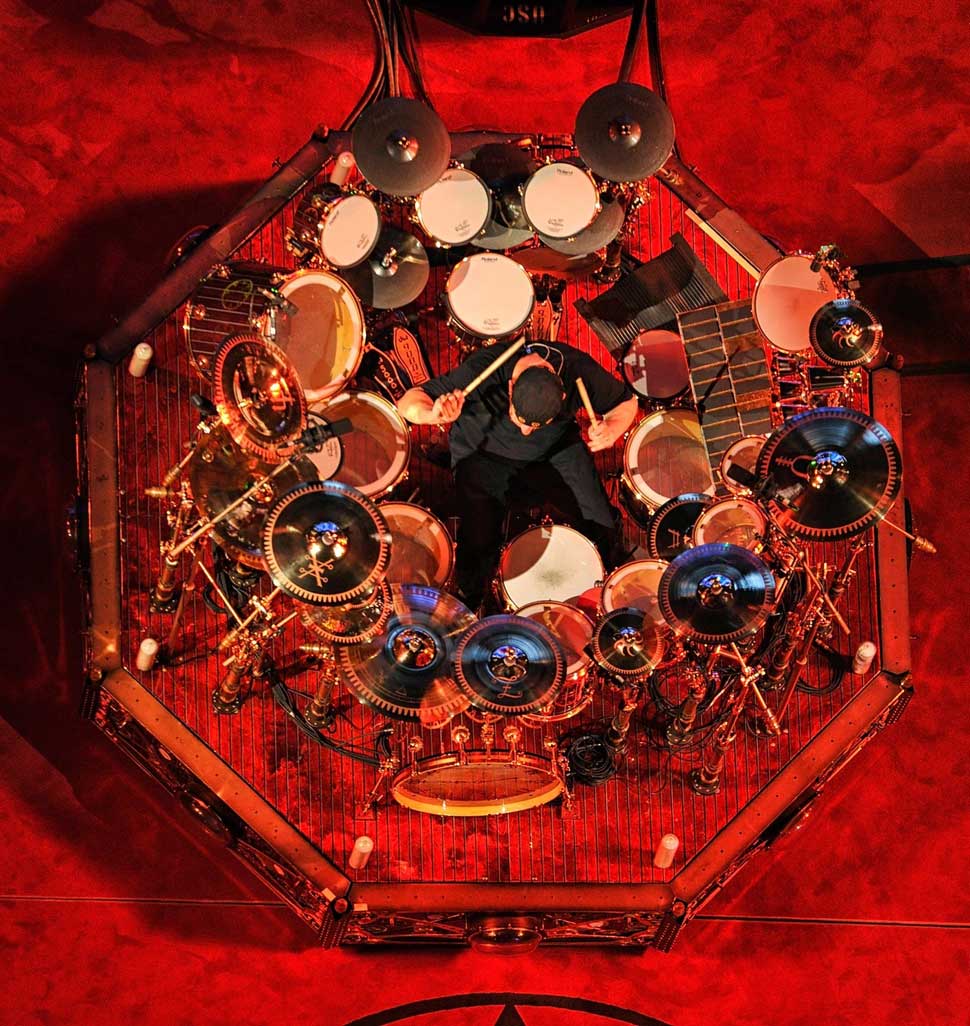
In Ghost Rider: Travels On The Healing Road, you talked about the bike saving you.
The bike did save me, absolutely. I had nothing else to do; there was nothing else I could do. The telling episode was on the first day out. I’m in terrible weather, with logging trucks flashing me, and I’m miserable anyway and I’m lacking fortitude of any kind. And I thought, ‘I’ve got to turn around, I don’t want to do this.’ And then the other voice went: ‘Then what?’ Because I had nothing else, and the stupid things people say to you at a time like that… ‘Oh, at least you have your music.’ Fuck, what?! It’s so maddening. I just wish people wouldn’t say it, it’s so stupid. You don’t have anything. But it, the bike and the journey I took, absolutely did save me. But so did the booze and drugs! [Laughs]
You’ve just published Far And Away, a book of photos and stories from your bike trips.
That didn’t start out as a book; it was online pieces. I got so into that: the combining of images and words, and the grafting of a real time travelogue memoir, a letter to a friend – it has the character of all that. So that volume collected the first four years of those, and since then I’ve published five or six more online. That’s me, that’s my prose writing, that’s what I love to do.
Given the scope of something like Clockwork Angels, have you never thought of turning your hand to writing fiction?
It’s not me. Honestly, I did try. But essentially what I want to do is look around and try to put it into words. That became what I want most, what I get the most satisfaction from. I still love to read over that stuff because it’s like finding an old diary, the stuff that I was moved to record and then try to describe to others. That’s a whole other set of rules and how you bring it alive, not just for your own memory, but how you try to portray this for other people. So that’s plenty.
The band’s long-term photographer and friend, Andrew MacNaughtan died here in LA during the mix of the album. You were very close to him…
We were very close to him, my wife Carrie and I, to him and his partner, Alex. It was a heart attack; he was 47. It was devastating, but more disbelief really, shock. It’s still setting in. Anyone who’s lost someone will know that you keep seeing them. I keep seeing him: ‘Wait, there’s Andrew…’ It takes so long for the reality to set in and you stop seeing them. You don’t believe it yet, and you’re worried too, for me, for the survivors.
Here’s a provocative statement for you: death is for the survivors, the bell tolls for thee. I guess I didn’t come up with anything new there. So, my concern in all of this was to his family, and to Alex – especially Alex, as he’s got no rights under Ontario law and they’ve been together eleven years. Do you know what that is in gay years?! It’s like a hundred… But they were one of our favourite couples. We had so much fun with them, we did so much stuff together.
You’ve said that the lyrics to Camera Eye are an example of modern poetry. Does that mean they were the lyrical high ground for you?
To me, it’s not one of the enduring classics. I think I did what I set out to do there and it’s effective, but it’s not as powerful as a song like Bravado or Animate, lyrically. There are ones I know that have said something really worthwhile, and maybe in a beautiful way, like Bravado – songs like that have helped me, which is a measure of their worth, I guess.
There have been several times when I’ve suffered from the hubris of having flown too high. The opening lines to Bravado read ‘If we burn our wings flying too close to the sun’, which is then resolved in the chorus, ‘we’ll pay the price, but we will not count the cost’. ‘Put it behind you’, basically; ‘wish them well’. It was an early statement of that viewpoint. Several times those words have come back and soothed me.
As a band, you’ve never been afraid to evolve and try new things, but the change between Hemispheres and Permanent Waves is profound, like your full stop on the 70s era.
I know what you’re saying; we did have several ground shifts like that. The whole 80s thing with Peter Collins and the massively intricate production, we loved all that. Then we kind of stripped down again; by Counterparts we’d gone back to bass, drums, guitar again and that was a direct reflection of the times; the early 90s. I remember the first time I heard Nirvana, and then Temple Of The Dog and Soundgarden and those bands. They influenced us the same way that punk influenced us: in a stylistic and artistic way. I loved the rise of those bands coming out of the northwest and the return of guitar driven rock. We were okay, we’re a part of that. We’ve got guitars.
You say Rush is a continuum, but do you feel re-energised at this point in your careers?
I think so, perhaps. It has to be because we feel that way individually, which is why we are this way as a band. As team players, that’s who we are, that’s what this is, in the truest sense.
It’s quite the team.
I think so.
This feature originally appeared in Classic Rock Presents… Rush - Clockwork Angels, published in June 2012.
Philip Wilding is a novelist, journalist, scriptwriter, biographer and radio producer. As a young journalist he criss-crossed most of the United States with bands like Motley Crue, Kiss and Poison (think the Almost Famous movie but with more hairspray). More latterly, he’s sat down to chat with bands like the slightly more erudite Manic Street Preachers, Afghan Whigs, Rush and Marillion.




